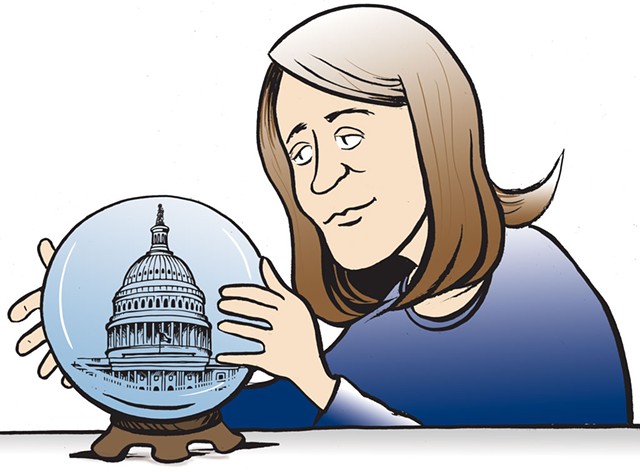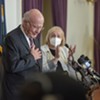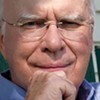Switch to the mobile version of this page.
Vermont's Independent Voice
- News
- Arts+Culture
- Home+Design
- Food
- Cannabis
- Music
- On Screen
- Events
- Jobs
- Obituaries
- Classifieds
- Personals
Browse News
Departments
Browse Arts + Culture
View All
local resources
Browse Food + Drink
View All
Browse Cannabis
View All
-
Culture

'Cannasations' Podcaster Kris Brown Aims to 'Humanize'…
-
True 802

A Burlington Cannabis Shop Plans to Host…
-
Business

Judge Tosses Burlington Cannabiz Owner's Lawsuit
-
Health + Fitness

Vermont's Cannabis Nurse Hotline Answers Health Questions…
-
Business

Waterbury Couple Buy Rare Vermont Cannabis License
Browse Music
View All
Browse On Screen
Browse Events
Browse Classifieds
Browse Personals
-

If you're looking for "I Spys," dating or LTRs, this is your scene.
View Profiles
Special Reports
Pubs+More
Lt. Gov. Molly Gray Says She’s Too Focused on Her Current Role to Think About Running for Congress
Published June 16, 2021 at 10:00 a.m. | Updated June 22, 2021 at 5:03 p.m.
Fair Game is Seven Days’ weekly political column.
Molly Gray doesn't really want to talk about going to Washington, even though the crowd around Vermont's political water cooler assumes she'll try someday.
The political phenom would rather recap her first session as lieutenant governor or recount her trip to Macedonia with the Vermont National Guard. Or lay out why Vermont needs paid family leave and how, without more affordable housing and childcare, the state's demographic gap will widen. Or how the pandemic revealed the depth of the broadband-access problem.
All the talk about Washington, D.C. — an idea her supporters were floating even before she beat three Democrats in the 2020 primary and then crushed her Republican opponent by 9 points — is, Gray says, premature and distracting.
In an interview last week in her Statehouse office, she pushed back on the central question: whether she has the right experience to be a credible candidate for Congress should Sen. Patrick Leahy (D-Vt.) step aside next year — against all expectations and prayers — and Rep. Peter Welch (D-Vt.) seek Leahy's job, leaving his House seat open.
Gray maintained that her résumé is different but sufficient. Her victory last fall from outside the "Montpelier infrastructure" shows there are nontraditional paths to political office, she said, and suggested it was sexist to ask her whether a candidate for Congress should have legislative experience.
"Would you say the same of Sen. Sanders?" she asked. Sen. Bernie Sanders (I-Vt.) won the state's lone House seat in 1991 after serving eight years as mayor of Burlington, an executive post. (His did regularly contend with a legislative body, the Board of Aldermen, during meetings so contentious they were rightly dubbed the Monday Night Fights.)
As a candidate last year, Gray said women face questions about youth and experience that male candidates don't. She pointed out that Leahy was just 34 when he ran for the U.S. Senate. (He had been elected Chittenden County state's attorney twice and had served eight years.)
Gray, 37, grew up on a dairy farm in Newbury. A graduate of the University of Vermont and Vermont Law School, she worked for Welch and later the International Committee of the Red Cross. She then did human rights work in Europe and most recently spent three years as a Vermont assistant attorney general. She is also the niece of the late Bill Gray, a former U.S. attorney for Vermont. He was a well-respected public figure who ran Leahy's 1986 campaign, lost his own U.S. Senate bid in 1988 to then-Republican Jim Jeffords and was awaiting confirmation to a federal judgeship when he died of leukemia in 1994 at age 52.
With those credentials, Gray, who had never run for political office and hadn't voted in elections for 10 years until 2018, raised nearly half a million dollars in 2020 and drew support in her primary race from high-profile Democrats including former governors Madeleine Kunin and Peter Shumlin. She beat a solid Democratic field and defeated Republican Scott Milne.
Gray rejects the premise that a deep political background is needed to go to D.C. and had a ready answer to counter the argument.
"I think we have a lot of incredibly qualified people here in the state that could do a lot of good work for Vermont in Washington, and I would like to say this: I hadn't run for office before. I have a bit of a different path. We have a lot of Vermonters with different paths, and a lot of Vermonters with incredible experience. And I think we need to see more people from more backgrounds, diverse backgrounds, running for office, engaging. That's what's going to make us stronger, more resilient in the future."
Welch was elected to Congress in 2006 after a lengthy career in the Vermont Senate. Prior to Welch and Sanders, Peter Smith had served in the Vermont Senate and two terms as lieutenant governor before going to Washington. He also helped set up the Community College of Vermont and was its first president. Jeffords was elected to the House after serving as Vermont attorney general and one term in the state Senate.
Gray agrees with others, including a group of prominent civic leaders, that Vermont, which has never sent a woman to Congress, should do so the next time there is an open seat.
Gray said it is premature to discuss future candidacies for Congress, particularly since it is not clear when there will be an open seat. But unlike House Speaker Jill Krowinski (D-Burlington), another next-generation Democratic leader who has said she would not be a federal candidate in 2022, Gray declined to take the idea off the table.
"I'm just trying to exhale," Gray said, citing the just-ended socially distanced legislative session and "a campaign that wasn't easy, not only because it was a pandemic, but it was a tough campaign. I'm so grateful to be elected, to be serving, and I'm trying to focus on that work."
If an opening occurs, "there's a different conversation," Gray said.
"I don't think it's healthy for me personally to entertain hypotheticals because of what I want to do, what I want to do right here, right now," she said. Voters lose, she said, when politicians are constantly looking ahead to the next election instead of focusing on the job at hand.
According to the state Constitution, Gray's $78,000-a-year job is limited to presiding over the Vermont Senate, breaking tie votes and serving on a panel that makes Senate committee assignments, as well as acting as Vermont's chief executive when the governor is out of state and taking over if the governorship becomes vacant. Like previous LGs — many of whom had political ambitions — Gray has used the largely ceremonial office to help raise her political profile.
For example, during the session, Gray held seven Seat at the Table events on issues including climate change, broadband, and paid family and medical leave that a total of 500 people attended virtually. Gray said she provided the House and Senate leaders a report on recommendations made so that the events were more than listening sessions.
This summer she'll conduct a Recover Stronger Tour to ask people how Vermont should spend federal coronavirus relief funds.
Are these forums thinly disguised campaign events, ways to build name recognition?
"I don't see it that way," Gray said. Getting input on how to best spend coronavirus funds "is not going to happen through phone calls here to the Statehouse."
Unlike some previous lieutenant governors, who've returned to the farm, a doctor's office, airplane cockpit or car dealership when the legislative session ends, Gray has no second job or current plans to practice law, though she's considering teaching classes at Vermont Law School in the fall.
"Right now, we've been pretty 24-7," she said, "I couldn't imagine right now taking on another job."
Only days earlier, Gray had returned from a weeklong visit to North Macedonia; Gov. Phil Scott had declined to join Vermont National Guard officials because of his pandemic-related duties and recommended Gray. The focus was to expand on the decades-old military-to-military partnership to include economic opportunities between North Macedonia and Vermont. The state's secretary of commerce and community development, Lindsay Kurrle, also went.
"They were just outstanding ambassadors for Vermont. There was no white space in the schedule," Adj. Gen. Greg Knight said. What Gray brought to the table, Knight said, was a legal background that could help facilitate ties with the Vermont Law School. Knight said Gray's farming knowledge was helpful when discussions turned to food security. Gray's "depth of experience was very helpful. These are things I don't specialize in," Knight said.
Since being sworn in, Gray has been peripatetic, including recent back-to-back days when she highlighted the Click It or Ticket program alongside law enforcement and later attended a remembrance for George Floyd, who was killed by a Minneapolis police officer. She has consistently promoted and visited vaccine sites; she got a shout-out along with other Vermont leaders from Leahy on the U.S. Senate floor Monday after the state reached the 80 percent threshold of residents vaccinated. Gray's Twitter posts can be rah-rah and feel-good on issues such as expanded voter eligibility, but she's also used social media to condemn threats to Roe v. Wade.
During the session, she regularly pushed out press statements applauding the passage of a bill or the work of her Senate colleagues.
One state senator grumbled that Gray sometimes appeared to try to take some credit for legislation she didn't work or vote on. For example, Gray proclaimed she was "particularly proud to serve as Senate president" when senators endorsed constitutional amendments protecting reproductive rights and denouncing slavery. Gray noted she always had to be prepared in case of a tie vote.
After we talked, Gray and I walked over to the ornate Senate chamber, where she needed to sign several bills before they went to the governor.
She motioned me up to the podium, to show me the impersonality and challenge of moderating a session while looking at a big computer screen. (During Senate sessions, Gray presided in the chamber, but the senators Zoomed in from home.)
Then she pulled up a small mat on the spot where the lieutenant governor stands, exposing a metal grate, and asked me what challenge it presented for a female lieutenant governor.
My first thought was that the grate led to a legendary system of tunnels and ducts where politicians could secretly hear their opponents. Then Gray took off her shoe and showed me how the heel could get stuck in the metal grate — a problem she fixed with a small piece of plywood from Lowe's.
Fully Charged
Here's another potential nontraditional candidate who could be considered for Congress: Mary Powell. The former CEO of Green Mountain Power thinks Leahy will run for reelection but said she'd "absolutely" consider running if an opening occurred.
"If I thought there was a big void and ... if I ever felt like I was the one that had unique skills that we needed at a certain time and place, absolutely I would consider it. But I don't see that happening in the next couple of years, frankly," Powell told Fair Game.
A lack of political experience, she said, wouldn't be an impediment.
"Our nation is rife with stories of passionate people running" who never ran before, Powell said.
Powell's 12 years helming GMP won her praise nationally as well as at home for her leadership skills, out-of-the-box thinking and "customer-obsessed" focus. Her fans include environmentalist Bill McKibben, who told Vermont Business Magazine when she retired in 2019 that "you could count the forward-thinking utility executives of America on the fingers of one finger. That would be Mary Powell."
During her time there, GMP divested its pension portfolios of fossil fuel stocks. It now sources 64 percent of its electricity from renewable sources.
Powell, 60, has been working on several clean energy projects and boards of directors since leaving GMP and may return to work full time.
"I've had a lot of chances over the last year and a half to get involved in things I find intellectually interesting and emotionally valuable. I'm just trusting the universe that I'm going to land where my kind of fire-hose personality is of best use," she said.
Media Notes
VTDigger.org health care reporter Katie Jickling is moving on after a year and a half. She'll pursue a master's degree in theology in Belgium and then a Fulbright-funded project in India next spring researching gender equity in the Protestant church. Jickling, who previously worked at Seven Days, helped lead Digger's coronavirus coverage. A recent investigative piece that detailed the abuse of students in Randolph by a vice principal was a prizeworthy tour de force.
Meanwhile, Scott Fleishman has left WCAX-TV after 11 years, primarily covering sports. He'll be taking a public relations post at Gifford Health Care, a network of community health centers throughout central Vermont and the Upper Valley.
Correction June 17, 2021: An earlier version of this column misstated how much Green Mountain Power energy comes from renewable sources.The original print version of this article was headlined "'Just Trying to Exhale'"
Related Stories
Got something to say?
Send a letter to the editor
and we'll publish your feedback in print!
More By This Author
About The Author

Mark Johnson
Bio:
Mark Johnson wrote the political column Fair Game for Seven Days June 2-September 21, 2021. He covered Burlington City Hall for the Burlington Free Press during mayor Bernie Sanders' third and fourth terms. He has also written for the Vanguard Press and other newspapers. From 1990 to 2015, he hosted the Mark Johnson Show, a public affairs program on WKDR and WDEV radio. He also worked as an editor at VTDigger.
Mark Johnson wrote the political column Fair Game for Seven Days June 2-September 21, 2021. He covered Burlington City Hall for the Burlington Free Press during mayor Bernie Sanders' third and fourth terms. He has also written for the Vanguard Press and other newspapers. From 1990 to 2015, he hosted the Mark Johnson Show, a public affairs program on WKDR and WDEV radio. He also worked as an editor at VTDigger.
Speaking of...
-

In an Exhibition of Photographs, Patrick Leahy Shares His Senatorial Sights and Insights
Feb 28, 2024 -

Texts Reveal Why Crypto Exec Backed Balint Over Gray in U.S. House Race
Oct 18, 2023 -

How a Senate Staffer From Norwich Helped Right the Wrong Done to J. Robert Oppenheimer
Aug 30, 2023 -

Leahy Named 'Distinguished Fellow' at UVM
Mar 2, 2023 -

Waiting in Washington: Becca Balint Enters a House in Disarray
Jan 3, 2023 - More »
Comments
Comments are closed.
From 2014-2020, Seven Days allowed readers to comment on all stories posted on our website. While we've appreciated the suggestions and insights, right now Seven Days is prioritizing our core mission — producing high-quality, responsible local journalism — over moderating online debates between readers.
To criticize, correct or praise our reporting, please send us a letter to the editor or send us a tip. We’ll check it out and report the results.
Online comments may return when we have better tech tools for managing them. Thanks for reading.
- 1. UVM, Middlebury College Students Set Up Encampments to Protest War in Gaza News
- 2. Dog Hiking Challenge Pushes Humans to Explore Vermont With Their Pups True 802
- 3. Scott Official Pushes Back on Former State Board of Ed Chair's Testimony Education
- 4. Governor Makes Last-Minute Appeal to Delay Vote on Ed Secretary Nominee Education
- 5. A Former MMA Fighter Runs a Wildlife Rehabilitation Center in Cabot News
- 6. Burlington Budget Deficit Balloons to $13.1 Million News
- 7. Home Is Where the Target Is: Suburban SoBu Builds a Downtown Neighborhood Real Estate
- 1. Totally Transfixed: A Rare Eclipse on a Bluebird Day Dazzled Crowds in Northern Vermont 2024 Solar Eclipse
- 2. Zoie Saunders, Gov. Scott’s Pick for Education Secretary, Faces Questions About Her Qualifications Education
- 3. Don't Trash Those Solar Eclipse Glasses! Groups Collect Them to Be Reused 2024 Solar Eclipse
- 4. State Will Build Secure Juvenile Treatment Center in Vergennes News
- 5. Vermont Awarded $62 Million in Federal Solar Incentives News
- 6. Queen of the City: Mulvaney-Stanak Sworn In as Burlington Mayor News
- 7. New Jersey Earthquake Is Felt in Vermont News















































